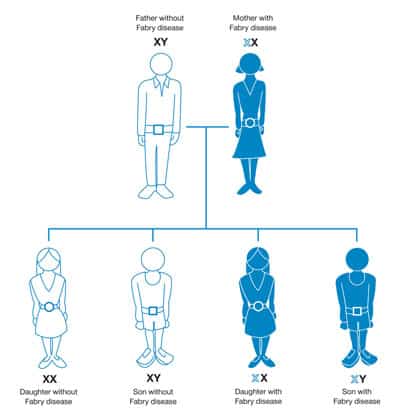What Is Fabry Disease?
Fabry disease runs in families. It can have lots of different symptoms, including pain in the hands and feet and a specific kind of rash.
When you have Fabry disease, a certain type of fatty substance builds up in your body. It narrows your blood vessels, which can hurt your skin, kidneys, heart, brain, and nervous system.
Your doctor may call Fabry disease a “storage disorder.” It usually starts in childhood and is much more common in men than women.
There are treatments that can make a difference in how you feel, day-to-day. Getting support from your family and friends is key, too.

Causes
You get Fabry disease from your parents. It’s passed down through genes.

The problem is that your body can’t make an enzyme called alpha-galactosidase A, which you need to break down fatty substances like oils, waxes, and fatty acids. When you have Fabry disease, you either were born without that enzyme or it doesn’t work right.
Symptoms
- Pain and burning in your hands and feet that get worse with exercise, fever, and hot weather or when you are tired
- Small, dark red spots usually found between your belly button and knees
- Cloudy vision
- Hearing loss
- Ringing in the ears
- Sweating less than normal
- Stomach pain, bowel movements right after eating
Fabry disease can lead to more serious problems, especially in men. These can include:
- Higher chance of heart attack or stroke
- Serious kidney problems, including kidney failure
- High blood pressure
- Heart failure
- Enlarged heart
- Osteoporosis
Treatment
Your doctor will probably recommend enzyme replacement therapy (ERT). It replaces the enzyme that is missing or not working correctly so that your body can break down fatty substances the way it should.
ERT is the only FDA-approved treatment for Fabry disease. It will help ease the pain and other symptoms that Fabry disease causes.
You will probably visit an outpatient center every few weeks to get the enzyme injected into a vein.
Your doctor may recommend that you also take:
- Drugs to relieve pain (prescription or nonprescription)
- Medicine for stomach problems
- Blood thinners or other drugs for irregular heartbeat or other heart problems
- Blood pressure medicine, which also helps protect your kidneys
You may need dialysis or a kidney transplant if Fabry disease has caused serious kidney damage.
- Blood, urine, and thyroidtests
- EKG (electrocardiogram). A nurse or other medical professional will attach soft, sticky patches to different parts of your body. These patches measure electrical signals from your heart and can tell how fast your heart is beating and if it has a healthy rhythm.
- Echocardiogram. This is an ultrasound of your heart. It can show if all the parts of your heart are healthy and if it’s pumping well.
- Brain MRI. An MRI, or magnetic resonance imaging, makes pictures of organs and structures inside your body.
- CT of your head. CT, or computed tomography, is a powerful X-ray that makes detailed pictures of the inside of your body.
- Hearing and eye exams
- Lung function test to see how much air you breathe in and out, and how much oxygen is getting to your blood
Taking Care of Yourself
Be good to yourself. Do things that you enjoy, spend time with people who are good company, and save your energy for the things that really matter to you. Part of that may involve saying “no” more often, and letting people know what would help you. That’s OK to do!

Post a comment